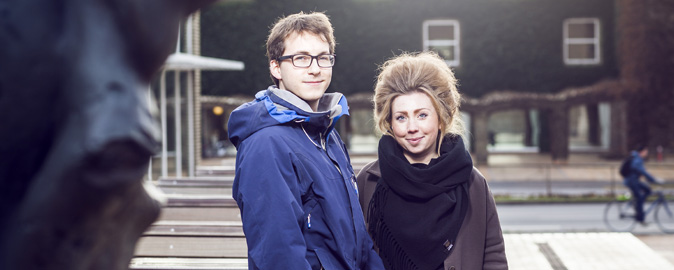University election 2013: Here are the winners
Heidi Klokker will be continuing as one of the two student representatives on the university board, while Andreas Birch Olsen is new to the job. They hope to put the issue of workload reductions for researchers on the agenda next year.

During the past year Heidi Klokker has represented the students on the university board during a turbulent period, with AU facing cuts of DKK 200 million and a round of staff dismissals. On 18 December she and the other board members will be asked to approve the AU budget for 2014. She is continuing for one more year alongside Andreas Birch Olsen, who is replacing Benjamin Bilde Boelsmand on the board.
“These are exciting times, and it’s important that we student representatives try to influence the way in which the management plan to make these cuts. In particular, we want to ensure that the cuts don’t affect the quality of our degree programmes,” says Klokker.
Increase in turnout
The two students have been given an increased mandate because the turnout in 2013 was almost 20 per cent, compared with 14 per cent last year. They think this was partly due to the debate on the study progress reform:
“It reveals that lots of students are really concerned about how the reform will affect them. But it also shows that we students have grown more aware of the decisions that are made in the boardroom. And the higher number of votes cast for specific candidates this year also shows that the students want their representatives to have a solid mandate,” says Klokker.
Workload reduction for researchers on the agenda
During 2013 she and Benjamin Bilde Boelsmand have put honours courses and the upgrading of teachers on the agenda. In 2014 she’d like the board to discuss external financing and workload reductions for researchers:
“The ministry is going to give the universities less money, which means that we will have to attract more external funding. But there are lots of problems here: it’s difficult to get your overheads covered with external funding (overheads include funds to cover the indirect costs of a research project such as administration, infrastructure and the cost of running buildings, ed.). And she adds:
“When major research projects are launched, the researchers involved are often given a workload reduction so they don’t have to teach but can focus on their research instead. This is a problem because it means that the latest research doesn’t get into the classroom, which detracts from the quality of our degree programmes,” she says.
Stronger democracy
Andreas Birch Olsen underlines that the two new representatives are a team, and he supports Heidi Klokker’s views. But he also mentions two other important projects: the appointment of a new pro-rector for education, and the implementation of the study progress reform.
“During the election campaign I found out that lots of students are interested in the upcoming cuts and the implementation of the reform. And I’d also like to strengthen democracy at local level in our degree programmes, as well as ensuring a freer framework for decisions in boards of studies and the academic environments.”
See who was elected to the academic councils, boards of studies and PhD committees at au.dk/valg
University election at AU
The turnout increased from 14 per cent last year to almost 20 per cent, corresponding to a 40% increase. But judging by the turnout for the elections to the various boards of studies, there is a difference in how interested AU students are in local democracy at the university from one degree programme to the next.
Top of the turnout league:
Board of studies | Turnout* |
Board of Studies for Public Health Science | 69.8% |
Subject Board of Studies for Political Science | 62.6% |
Board of Studies for Theology | 36.5% |
Bottum of the turnout league:
Board of studies | Turnout* |
Subject Board of Studies for Law | 21% |
Board of Studies for the Aarhus School of Science | 20.8 % |
Subject Board of Studies for Business Economics | 14.4% |
*Turnout for elections to boards of studies
Translated by Nicholas Wrigley

